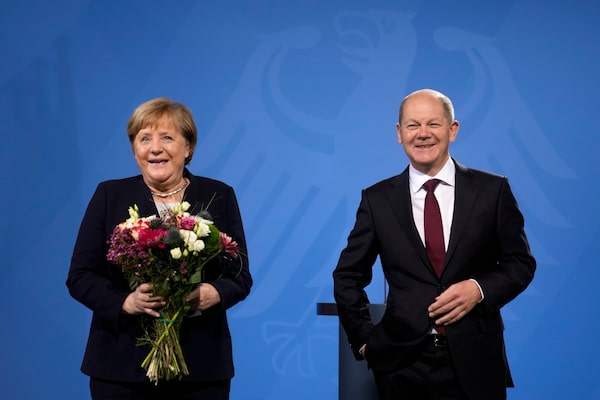
German Chancellor Olaf Scholz, right, and former Chancellor Angela Merkel laugh together during a handover ceremony in Berlin, on Dec. 8, 2021.Markus Schreiber/The Associated Press
Germany, poor Germany, is once again being called the sick man of Europe. The continent’s biggest economy first earned that tag after the Berlin Wall came down and the costs of reunifying West and East Germany proved almost crippling. Unemployment soared, exports sagged. Embarrassed by the economy’s slug-like performance, Berlin passed a series of reforms that saw the country become a manufacturing and exporting powerhouse, filling driveways around the world with BMWs, Mercedes and Volkswagens.
Today, Germany is well on course to become the only G7 economy to shrink this year, after three quarters of flatlining or contraction. The country this month posted its steepest decline in business activity, measured by the purchasing managers’ index (PMI), in more than three years. On Friday, another key economic indicator, a sentiment gauge that indicates companies’ outlook for the next half-year, dropped for the fourth consecutive month. Both sets of data point to recession.
Even Italy, the perennial dog among the G7 and big European Union economies, will outperform Germany this year by a long shot. The International Monetary Fund recently revised Italy’s growth upward to 1.1 per cent for 2023. And Germany? Its gross domestic product is forecast to fall by 0.3 per cent – hardly a crisis, but still humiliating for an economy that had seemed bulletproof.
Who to blame? Sure, weakness in China, one of Germany’s top export destinations, and the steep rise in interest rates are working their dark magic. But these factors are hitting all of the EU biggies, none of which is falling apart. The true culprit is Angela Merkel, who was Germany’s Christian Democrat chancellor from 2005 until late 2021, when she was replaced by Olaf Scholz. Her economic mistakes came with a time lag and are now haunting her old realm.
During her time in office, Ms. Merkel enjoyed unrivalled status pretty much everywhere. She became the de facto leader of Europe and, after Donald Trump took the White House and began shredding democracy, was called “the leader of the free world” by some newspapers. She was considered pragmatic, measured, though excessively cautious. She earned praise for her response to the climate crisis and the pandemic and was lauded as a humanitarian. Predictions among the conservative right that allowing a million refugees, many of them Syrian, into the country in 2015 would trigger a xenophobic backlash, a security nightmare and economic pain never came to pass.
And, remarkably, she was applauded for driving the economy to ever greater heights. But we now know this happened despite her economic policies, not because of them.
Take infrastructure. Despite the country’s riches, German infrastructure, from roads to high-speed internet, is substandard by any measure. For years, Germany’s spending on information technology as a share of GDP has been half or less than that of France and the United States. The sorry state of infrastructure, including maintenance of every type, hurts competitiveness. This is not Mr. Scholz’s fault. Last week, German Foreign Affairs Minister Annalena Baerbock cancelled a week-long trip to Oceania because technical problems on her clapped-out Airbus A340 left her stranded in Abu Dhabi.
Germany is mired in bureaucracy, and government offices are saddled with ancient technology. But all this is far from the biggest problem. That by far was Ms. Merkel’s epic campaign to make Germany wholly dependent on Russian energy – a carryover from the era of her Vladimir Putin-adoring predecessor, Gerhard Schröder. Even Mr. Trump, among other world leaders, warned her of the dangers of connecting Germany to two massive Russian natural gas pipelines, Nord Stream 1 and 2.
Sure enough, gas exports to Germany via Nord Stream 1 were halted by Mr. Putin after the war started and Mr. Scholz refused to certify Nord Stream 2, then the two pipelines were wrecked in an undersea explosion whose culprits remain unknown (U.S. investigative journalist Seymour Hersh blamed the Biden administration for the attack).
Ms. Merkel long before had set Germany up for an energy crisis by ordering the closing of the country’s vast fleet of fairly modern, emissions-free nuclear reactors, even though Germany had never suffered a major nuclear accident. The last one closed in April. Of course, with no Russian pipeline gas and no nukes, Germany has had to reopen coal burners, filling the skies with soot and carbon dioxide and making a mockery of its net-zero plans.
German industry took casualties last winter as energy prices soared. Energy-intensive businesses such as the glass, car and steel industries are still suffering; even though oil and gas prices have come down, they are still well above the long-term average, and another energy crisis may emerge this winter. German companies are fleeing to countries with low energy prices, such as the United States.
The energy fiasco is, above all, causing Germany’s slide into recession. Political upheaval may be next. Alternative für Deutschland (AfD), the far-right, pro-Russia, anti-war party is polling at 20 per cent. The economic doldrums are propelling its rise, especially in eastern Germany. The country is now paying the price for Ms. Merkel’s dubious economic policies. In a time of war, repairing the damage she inflicted on the economy will emerge as Mr. Scholz’s ultimate test.